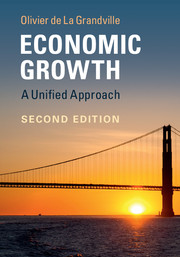Book contents
- Frontmatter
- Dedication
- Contents
- Foreword
- Preface to the second edition
- Introduction to the first edition
- PART I POSITIVE GROWTH THEORY
- PART II OPTIMAL GROWTH THEORY
- PART III A UNIFIED APPROACH
- In conclusion: on the convergence of ideas and values through civilizations
- Further reading, data on growth and references
- Index
PART I - POSITIVE GROWTH THEORY
Published online by Cambridge University Press: 01 December 2016
- Frontmatter
- Dedication
- Contents
- Foreword
- Preface to the second edition
- Introduction to the first edition
- PART I POSITIVE GROWTH THEORY
- PART II OPTIMAL GROWTH THEORY
- PART III A UNIFIED APPROACH
- In conclusion: on the convergence of ideas and values through civilizations
- Further reading, data on growth and references
- Index
Summary
Economics was born when some people asked the questions: How can society improve its living standards? What are the conditions of prosperity? Those questions define the essence of growth theory. It is no wonder that in the Western world they were raised – rather timidly – at the end of the Renaissance only, by Botero (1589, 1598), and then by Sully (1639) and Child (1668). Why not earlier? Because economics, as any science, is founded on observation; no sign of growth had ever appeared in the Middle Ages – and how could it have after the endless wars and plagues that ravaged Europe, particularly in the fourteenth century? Those times carried no hope, and it would have taken a bold thinker to entreat the question of development. As the French historian Pierre Gaxotte very well put it, “the man of the Middle Ages does not know of time and numbers”.
It is not surprising therefore that we owe to Arab civilization the first comprehensive description of the fundamental causes of growth. In his Muqaddimah (1377), the Arab historian Ibn Khaldun went even further and set himself to explain the causes of the rise and decline of civilizations. This is a good place to recall what Arnold Toynbee (1934, p. 321) had to say about Ibn Khaldun's magnum opus:
He appears to have been inspired by no predecessors, and to have found no kindred souls among his contemporaries, and to have kindled no answering spark of inspiration in any successors; and yet, in the Prolegomena (Muqaddimah) to his Universal History he has conceived and formulated a philosophy of history which is undoubtedly the greatest work of its kind that has ever yet been created by any mind in any time or place.
Ibn Khaldun's contribution encompasses not only the description of the growth process, but also what needs to be done to set it in motion. His essay therefore is not only positive or descriptive; it is normative as well, and it shares that characteristic with Adam Smith's “Inquiry into the Nature and the Causes of the Wealth of Nations” that came four centuries later.
- Type
- Chapter
- Information
- Economic GrowthA Unified Approach, pp. 1 - 2Publisher: Cambridge University PressPrint publication year: 2016



